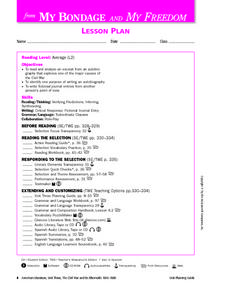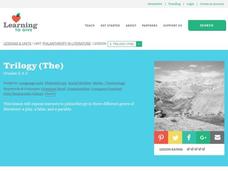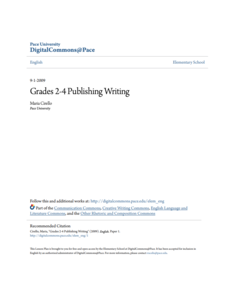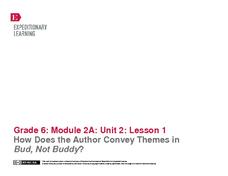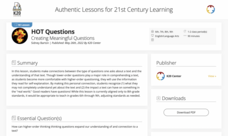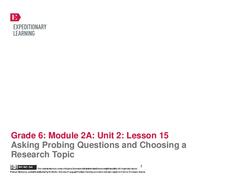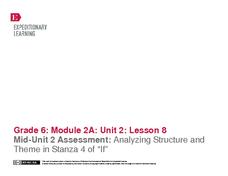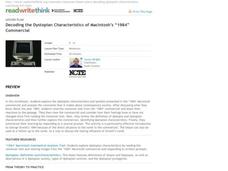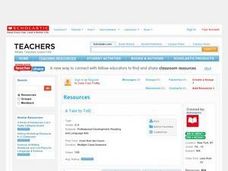Curated OER
American Literature Unit Two
Middle schoolers prepare for and respond to literature selections. This package includes nineteen lessons from the American Literature, A New Nation: 1750-1850 series, each covering a different reading selection. Pre-reading and response...
Curated OER
American Literature, The Earliest Days
Students prepare for and respond to literature selections. This package includes eleven lessons from the American Literature, The Earliest Days: Prehistory to 1750 each covering a different reading selection. Pre-reading and response...
Curated OER
American Literature and the Civil War
Students prepare for and respond to literature selections. This package includes fourteen lessons from the American Literature, The Civil War and Its Aftermath: 1845-1880 series, each covering a different reading selection. Pre-reading...
Curated OER
World Literature From Africa
Students prepare for and respond to literature selections. This package includes twenty-four lessons from the World Literature series, each covering a different reading selection from Africa. Pre-reading and response activities are...
Curated OER
Philanthropy in Literature
Students research philanthropy in three genres: a play, a fable, and a parable. Students read an Aesop fable and answer questions in groups. Students complete steps in two worksheets from 'The Good San Franciscan' and 'Someone Should.'...
Pace University
Publishing Writing
Scholars become familiar with tagline literature with the help of the story, Alexander and the Horrible, No Good, Very Bad, Terrible Day by Judith Viort. After a read-aloud and whole-class discussion, leveled groups complete...
EngageNY
How Does the Author Convey Themes in Bud, Not Buddy?
After reading up to chapter 12 of Bud, Not Buddy by Christopher Paul Curtis, scholars read chapter 13 and take part in a grand conversation about the author's writing techniques. Pupils discuss how his writing conveyed literary themes...
EngageNY
Writing: Drafting Body Paragraphs and Revising for Language
Begin the drafting phase of the writing process with a lesson plan focused on logically writing three body paragraphs. Then, revise the writing to make it more formal after a teacher-directed mini-lesson plan. Each paragraph highlights...
K20 LEARN
HOT Questions: Creating Meaningful Questions
Scholars examine a list of questions and sort them into corresponding groups based on similarities. A gallery walk allows peers to see how their peers sorted questions and leave notes. Costa's Level of Questions is the topic of a...
Curated OER
Coming of Age During Japanese Occupation: Richard E. Kim's Lost Names: Scenes from a Korean Boyhood
Explore the implications of the Japanese occupation of Korea during World War II. Learners read Lost Names: Scenes from a Korean Boyhood, participate in classroom discussions about the novel and keep journals in which they respond to...
EngageNY
Notices and Wonders of the Second Stanza of “If”
Here is an instructional activity that asks pupils to analyze poetry and sparks discussion about two different types of texts: asking how is the poem, If by Rudyard Kipling alike and different from the story, Bud, Not Buddy by...
EngageNY
Asking Probing Questions and Choosing a Research Topic
Begin the writing journey of an evidence-based essay detailing a rule to live by with various activities to familiarize learners with the topic and jump-start brainstorming. First, pupils take part in an in-depth review and discussion of...
EngageNY
Qualities of a Strong Literary Argument Essay
One activity, two essays, and one central theme: qualities of an argument essay. Here, scholars first describe the qualities of an argument essay regarding Bud's rules to live by from the novel Bud, Not Buddy by Christopher Paul Curtis....
EngageNY
Analyzing Structure and Theme in Stanza 4 of “If”
Here is a lesson that provides scholars with two opportunities to stretch their compare-and-contrast muscles. First, learners compare and contrast their experience reading the fourth stanza of If by Rudyard Kipling to listening to the...
Pace University
Urban Communities
Urban communities are the focus of a series of lessons created to meet specific needs using differentiated instruction. A pre-assessment designates scholars into three groups based on their ability level. Small groups take part in...
Curated OER
Aesop's Fables
Examine the fables of Aesop with your class. Pupils identify the morals of fables and role-play a scene from their favorite fable of Aesop. Additionally, they compose letters to a favorite character in the fable. Learners role-play again...
August House
The Magic Pot
The Magic Pot by Patricia Coombs is the theme of this multidisciplinary lesson plan. Early readers first take part in a read aloud and grand conversation about the story's details. Then, they get to work practicing their skills in...
MENSA Education & Research Foundation
Hurricanes
Learn the ins and outs of hurricanes through a series of lessons answering, "What is a hurricane? How does it travel? How is one formed, measured, and named?" Information is presented through informative text and images, while...
Curated OER
Introduction to Drama
Introduce your class to drama! You cast each pupil as a different character from a story you have read. They are given a general outline of the scene, act out the scene multiple times, then discuss the weak and strong aspects of each...
ReadWriteThink
Decoding the Dystopian Characteristics of Macintosh’s “1984” Commercial
Known as one of the most iconic advertisements of the 20th century, Macintosh's "1984" commercial has become more of a social statement. Present the ad to a new audience of viewers with a lesson plan focused on identifying dystopian...
Scholastic
A Tale to Tell!
A creative spin occurs when one pupil acts as author Ann M. Martin. Using a Q & A at the back of her book A Dog's Life, other classmates ask the "author" questions. They discuss the reasons why they know the book is from a...
Education Oasis
Creative Writing Unit: Analyzing, Interpreting, Discussing and Writing Various Genres of African-American Literature
A six-week unit takes high schoolers through various works of African-American literature, including poems, plays, and short stories. The lesson plan format includes a week-by-week description of activities, goals, materials, and...
Curated OER
Chatty Cherry Stories
Young artists will respond to reading children's literature, by engaging in original storytelling and representing their own images through the visual arts. Then they orally describe details of people, places, and things in their stories...
Curated OER
Two Settings
Learners respond to the text Riding Freedom. They will compare and contrast two settings by filling in a graphic organizer. They explore different settings, discuss the reasons why settings change, and draw conclusions using descriptive...
Other popular searches
- Response to Literature
- Response to Literature Essay
- Theme Response to Literature
- Response to Literature Genre
- Responses to Literature
- A Response to Literature
- Avid Response to Literature
- Free Response to Literature
- Writing Response to Literature
- Literature Responses
- Night Responses to Literature
- Short Response to Literature


